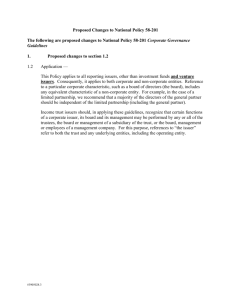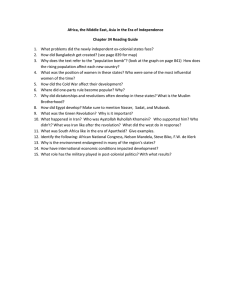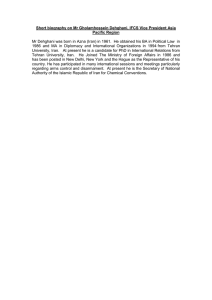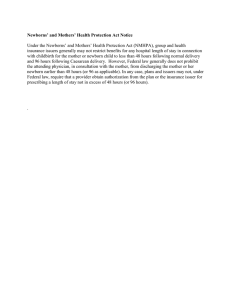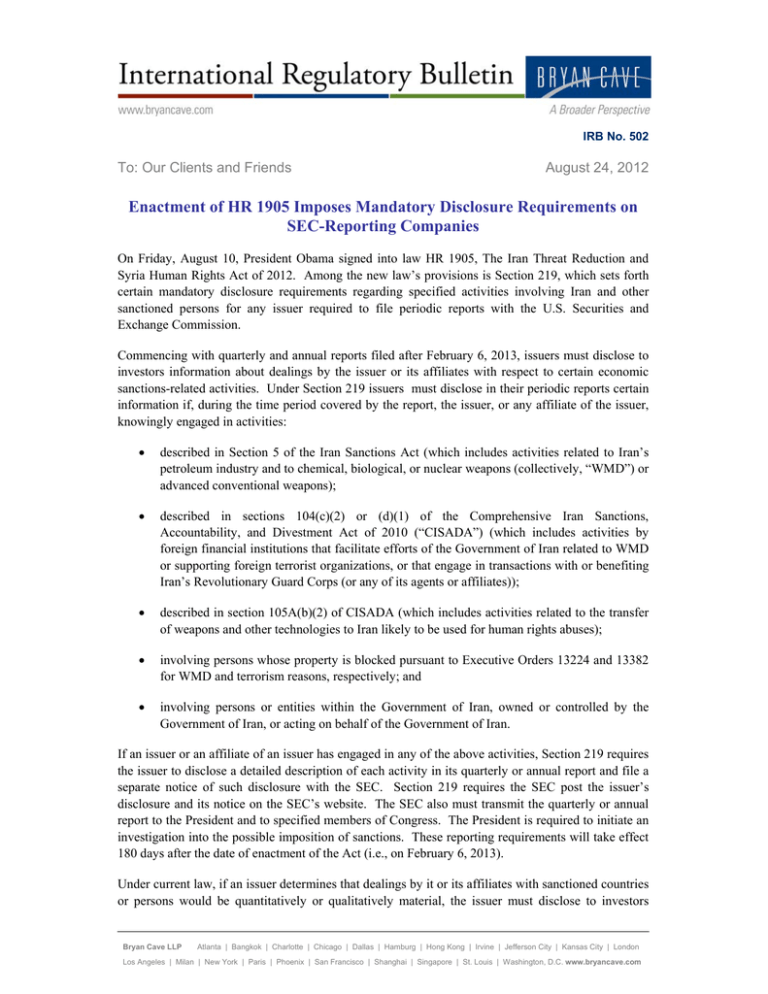
IRB No. 502
To: Our Clients and Friends
August 24, 2012
Enactment of HR 1905 Imposes Mandatory Disclosure Requirements on
SEC-Reporting Companies
On Friday, August 10, President Obama signed into law HR 1905, The Iran Threat Reduction and
Syria Human Rights Act of 2012. Among the new law’s provisions is Section 219, which sets forth
certain mandatory disclosure requirements regarding specified activities involving Iran and other
sanctioned persons for any issuer required to file periodic reports with the U.S. Securities and
Exchange Commission.
Commencing with quarterly and annual reports filed after February 6, 2013, issuers must disclose to
investors information about dealings by the issuer or its affiliates with respect to certain economic
sanctions-related activities. Under Section 219 issuers must disclose in their periodic reports certain
information if, during the time period covered by the report, the issuer, or any affiliate of the issuer,
knowingly engaged in activities:
•
described in Section 5 of the Iran Sanctions Act (which includes activities related to Iran’s
petroleum industry and to chemical, biological, or nuclear weapons (collectively, “WMD”) or
advanced conventional weapons);
•
described in sections 104(c)(2) or (d)(1) of the Comprehensive Iran Sanctions,
Accountability, and Divestment Act of 2010 (“CISADA”) (which includes activities by
foreign financial institutions that facilitate efforts of the Government of Iran related to WMD
or supporting foreign terrorist organizations, or that engage in transactions with or benefiting
Iran’s Revolutionary Guard Corps (or any of its agents or affiliates));
•
described in section 105A(b)(2) of CISADA (which includes activities related to the transfer
of weapons and other technologies to Iran likely to be used for human rights abuses);
•
involving persons whose property is blocked pursuant to Executive Orders 13224 and 13382
for WMD and terrorism reasons, respectively; and
•
involving persons or entities within the Government of Iran, owned or controlled by the
Government of Iran, or acting on behalf of the Government of Iran.
If an issuer or an affiliate of an issuer has engaged in any of the above activities, Section 219 requires
the issuer to disclose a detailed description of each activity in its quarterly or annual report and file a
separate notice of such disclosure with the SEC. Section 219 requires the SEC post the issuer’s
disclosure and its notice on the SEC’s website. The SEC also must transmit the quarterly or annual
report to the President and to specified members of Congress. The President is required to initiate an
investigation into the possible imposition of sanctions. These reporting requirements will take effect
180 days after the date of enactment of the Act (i.e., on February 6, 2013).
Under current law, if an issuer determines that dealings by it or its affiliates with sanctioned countries
or persons would be quantitatively or qualitatively material, the issuer must disclose to investors
Bryan Cave LLP
Atlanta | Bangkok | Charlotte | Chicago | Dallas | Hamburg | Hong Kong | Irvine | Jefferson City | Kansas City | London
Los Angeles | Milan | New York | Paris | Phoenix | San Francisco | Shanghai | Singapore | St. Louis | Washington, D.C. www.bryancave.com
information about such dealings. Current disclosure requirements emanate from the implementation
by many states, public institutions, universities and municipalities of divestment provisions requiring
divestment from and/or prohibiting investment in entities where the company or its subsidiaries have
dealings with U.S. sanctioned countries such as Iran, Sudan, or Syria. Presently, the Office of Global
Security Risk within the SEC monitors whether the documents public companies file with the SEC
include disclosure of material information regarding global security risk-related issues, such as
dealings with sanctioned countries. From time to time, the Office of Global Security Risk sends
inquiries to issuers about activities involving sanctioned countries.
Section 219 of HR 1905 effectively eliminates the materiality standard for disclosing certain dealings
with Iran, requiring an issuer to disclose detailed information about itself and any of its affiliates
related to certain transactions involving the Government of Iran and other persons sanctioned by the
U.S. as outlined above. Under the new reporting requirements, issuers will be required to report any
activities outlined in Section 219 of the Act that involve themselves or their affiliates (both domestic
and foreign). In addition, with the exception of licensed transactions involving the Government of
Iran, all activities must be disclosed. For example, a transaction with the Government of Iran by an
affiliate that is not owned or controlled by the issuer (which dealings therefore may not be required to
be licensed by the Department of the Treasury’s Office of Foreign Assets Control pursuant to other
provisions in HR 1905 and implementing executive orders or regulations) would need to be reported.
In addition, disclosure would be required under Section 219 for a licensed transaction involving an
individual whose property is blocked pursuant to Executive Orders 13224 or 13382 for WMD or
terrorism reasons.
A practical impact of Section 219 may be to cause issuers (and their affiliates worldwide) to shore up
existing compliance procedures to screen against the List of Specially Designated Nationals and
Blocked Persons, which includes persons whose property is blocked pursuant to Executive Orders
13224 and 13382. Screening should occur before the issuer certifies its quarterly or annual reports to
the SEC to take into account changes to business activities as well as any additions or other changes
to lists of persons blocked under Executive Orders 13224 and 13382. Issuers that are screening on an
annual or semi-annual basis should consider increasing the frequency of screening to quarterly. In
addition, because the new law requires reporting for any “dealings,” issuers may want to consider
whether screening should include employees, customers, suppliers/vendors, partners/agents, and any
other entities (including financial institutions) involved in transactions with the issuer and all its
affiliates.
To the extent that an issuer or any one of its affiliates does not already have a screening program in
place, the issuer will also want to consider implementing a screening program addressing the
information necessary to make the certification. Because implementation of thorough screening
measures often is time consuming, issuers should begin examining their compliance processes long
before February 2013 to ensure that the measures are adequate to address the mandatory reporting
requirements.
_______________________________________________
Prepared by:
Megan Gajewski and Lynn Van Buren
1.202.508.6302 or 1.202.508.6320
megan.gajewski@bryancave.com or lynn.vanburen@bryancave.com
Bryan Cave – Washington D.C.
Bryan Cave’s International Regulatory Bulletins are available online at www.bryancave.com
Please visit our Global Anti-Corruption website at www.bryancave.com/gact
Bryan Cave LLP
Atlanta | Bangkok | Charlotte | Chicago | Dallas | Hamburg | Hong Kong | Irvine | Jefferson City | Kansas City | London
Los Angeles | Milan | New York | Paris | Phoenix | San Francisco | Shanghai | Singapore | St. Louis | Washington, D.C. www.bryancave.com
Bryan Cave LLP International Trade Client Service Group
Los Angeles
Shanghai
Evan Y. Chuck, Partner, CSG Leader
David Stepp, Partner
Nicole Simonian, Partner
Andrew Klungness, Partner
Michael Zara, Associate
Jackson Pai, Associate
Washington
Stanley Marcuss, Partner
Daniel Schwartz, Partner
Susan Kovarovics, Partner
Clif Burns, Counsel
Lynn Van Buren, Counsel
Michael Mellen, Associate
Megan Gajewski, Associate
Christina Zanette, Associate
George Murphy, Associate
Chicago
Nicola Fiordalisi, Partner
Patricia Hanson, Counsel
Hamburg
Alexandra Rose
Dr. Michael Leue, Partner
Dr. Staffan Wegdell, Counsel
Martin Bosse, Associate
St. Louis
Fred Bartelsmeyer, Partner
New York
Judith Rinearson, Partner
Hassan Albakri, Associate
Atlanta
Joel Williams, Partner
Denver
Jenny Van, Associate
Garth Jensen, Partner
David Wilson, Partner
Evan Y. Chuck, Partner
Zhongdong Zhang, Principal
Yi Huang, Associate
Joseph Wang, Associate
Joseph Drury*
Estelle Lee, International Regulatory
Specialist*
Min Lan, Director of Economic Analysis*
Flora Sun, Director*
Zhao Jun, Senior Advisor*
Chian Voen Wong, Associate Director*
Jeff Chen, PRC Consultant
Stella Huang, PRC Consultant
Singapore
Cecil Leong, CEO of BCIT, International Trade
Deputy Leader*
Tony Kerr, Senior Director*
Stephanie Wong, Senior Manager*
George Tan, Director, Asia Export Controls*
Bangkok
Malika Bhumivarn, Managing Director,
Thailand*
Kittipong Jangkamolkulchai, Associate
Director*
Tokyo
Tatsuya Kanemitsu, Senior Manager*
London
Anita Esslinger, Partner
Paris
Joseph Smallhoover, Partner
Aurelie de Raphelis Soissan, Associate
Frankfurt
Tobias Fenck, Partner
*Non-legal professionals
Note: This Bulletin is intended solely for general informational purposes and should not be construed as, or used as a substitute for, legal
advice with respect to specific transactions. Such advice requires a detailed analysis of applicable requirements and an evaluation of precise
factual information. We do not undertake to keep recipients advised as to all relevant legal developments. This Bulletin may be construed as
an advertisement or solicitation. ©2009 Bryan Cave LLP. All rights reserved.
Bryan Cave LLP
Atlanta | Bangkok | Charlotte | Chicago | Dallas | Hamburg | Hong Kong | Irvine | Jefferson City | Kansas City | London
Los Angeles | Milan | New York | Paris | Phoenix | San Francisco | Shanghai | Singapore | St. Louis | Washington, D.C. www.bryancave.com

